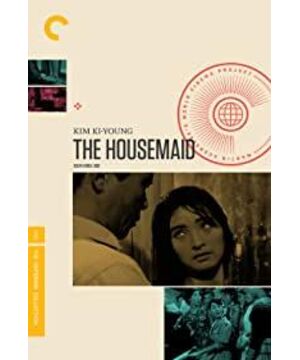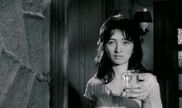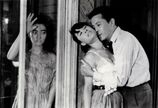I often get into movies by reading short stories. In addition to camera language and music, I am more concerned with literary factors such as intention creation, character relationships, and background of the times, which makes me more or less extreme and harsh when viewing images. Taking this ruler for a card, many movies that are based on pure image construction will not stimulate my senses, but those with solid stories can grab my attention in an instant.
Jin Qiyong is not a "popular" director, I hadn't even heard of this name before this festival. Although Bong Joon-ho and Martin Scorsese both admire him, his ghostly style still makes him a term rather than a great director in people's minds.
Before becoming a film director, Jin Qiyong was an intern. In 1951, when the North Korean army withdrew, he came to Busan and stepped into the movie gate through the introduction of the movie playwright Wu Yongzhen. His early works have a strong Italian neo-realism style, and the "Lady" born in 1960 marked the transformation of his style.
I think that the movie "Lady" has reached the best level in my opinion in terms of image, storytelling and metaphor at the same time.
The story itself is not complicated, and it can even be reduced to a rough "derailment and fighting against Xiaosan" story, but in fact, this is just a very superficial layer, just like the weird preaching that suddenly appeared at the end of the movie, if anyone thinks this movie discusses It's something as simple as male desire, the director really wasted his time and energy.
As the source of space inspiration for Feng Junhao's "Parasite", "Lady" is quite attentive in space creation. When there are too many indoor shots, the movie can easily become a drama, and the repeated scenes will also bring boredom, but in the process of watching this movie, I was fully absorbed, and there was no sense of boredom. The recurring staircase, although illogical in the second half of the play, rushes to the core of the conflict, is particularly unique as a corridor connecting the "girl" and "the protagonist's family". The staircase is not only a metaphor, but also plays a role in advancing the story.
The perfect combination of story and intent
The two details of "stairs" and "rat poison" originally only needed to bear the original attributes, but after the director's ingenious conception, they became metaphors throughout the film. When Fuyi, the "lower daughter", entered this pseudo-middle-class family, she sneaked into the kitchen and sucked her fingers. She quickly used her sensitivity to catch the mouse. The repeated occurrence of scooping white rice and stealing food also confirms a hint that the "girl" is the big mouse that enters the family, and it is the danger of destroying the peaceful life.
As for the stairs, they are not only the connecting passage between the middle floor and the lower floor, but also a superb prop for space replacement. At the end of the film, "Xia Nv" forces the male host to go to her room to sleep with her every night, while the hostess can only stay downstairs to weave cloth and take care of the children. "Xia Nv" ignores her paranoid All forces have reversed class relations, and now the stairs are like changing sides - the maid becomes the mistress, and the mistress becomes the maid.
At the same time, the location of the next girl’s room is exactly parallel to the position of the piano room, which also gives the next girl the motivation and opportunity to run away. When the rainstorm falls, the next girl has nowhere to escape. . It's not so much a room as it is a cabinet. The "girl" who hides in the dark like a mouse knows everything about the hypocrisy of this middle-class family.
Recurring glass and piano
I also really like mirrors, glass, and pianos. I watched "The Last Emperor" before, and there was a scene where the queen's loneliness was reflected in the mirror. I liked the use of mirror-like elements in the movie.
The director's role as a pianist for the hero makes the whole movie more poetic and playful. As a symbol of class status and nobility, the piano has become an element that everyone admires for the hero. Every time "Lady" touches the piano out of curiosity, he will be severely rejected by the male protagonist - "You are not allowed to touch the piano". This attitude is more like an assignment to class, and the piano becomes an asset symbol rather than a gateway to art. And the female factory worker who initially seduced the male protagonist then borrowed learning the piano to get close to the male protagonist, which further reveals the hypocrisy and nihilism of capitalism.
In the middle, the hostess teased that the hostess didn't accompany her to the movies, so she wanted to buy a big TV and go home. When the TV finally moved into the house, everything had swelled out of control. And the hero blames the heroine in the hysteria at the end of the film - "It's because you said you want to change to a bigger house, wouldn't these things not happen if you live in a small house?" At this point, all illusions about happiness have been extinguished, and the hostess Feeling that the happiness that you are chasing is completely out of the mirror.
When watching the Korean drama "Please Answer 1988" and some Taiwanese novels, I can clearly feel that the life of my generation may be similar to the life experienced by the previous generation in these regions of East Asia. Take the purchase of luxury bags as an example, it should be Japan. The behavior of people in the early stage of economic development, and this behavior generally occurs in my generation of Chinese people.
The typical feature of the consumer society is to give everyone a fantasy - "As long as you work hard, make money, and buy those better quality goods, you can live the life you want."
In this movie, the hostess has just given birth to her third child and is still in her confinement period, she struggles to stand up from the bed with a pale face, and walks to the sewing machine, which is her production factor. Just like a popular saying a few years ago - "You are writing PPT in an office building and your grandma stepping on a sewing machine is no different." The hostess's sewing machine is very much like the computer in the hands of today's urban white-collar workers. There is a joke that the computer is the person, and every person who comes to the computer is actually a tool, because the computer is always on that desk, and the person is constantly being replaced like a tool.
Nothing goes to the bottom of destruction
In fact, the next girl is also a bait girl. In any case, she is a despised existence. Our current society is too one-sided to discuss issues, and we always think that those who exaggerate their desires are "not good-looking".
Why do you feel that the desires of the lower classes are inflated? In fact, he is still substituting the illusion that he is a middle class.
L recently told me a story. He said that their company signed an Internet celebrity, and that girl likes to wear revealing clothes. At first, he thought the girl was vulgar, but after chatting, he found out that this girl was actually the legendary "brother-in-law". The girl has two younger brothers, and her mother has always asked the girl to marry a rich man. The dowry must be one million yuan. The girl also broke up with her ex-boyfriend for this reason. Girls want to make money, want to be popular, and want to marry a rich man is not only a personal desire but also a family expectation.
In this film, the next girl is inferior to the female factory worker. She doesn't even know what she wants to do, what she likes to do, and when others give her a cigarette, she will smoke. She said, "Let her smoke for a better order. "She", this sentence is actually a profile of consumerism. Feeding poor girls' fantasy of luxury is to make them sell their bodies. The seduction of the female master is not out of pure primitive lust, but for herself. Disapproved by the class, she thinks she is marginalized - looked down upon by the second son of the master's family, and abused by the female piano worker, she can't find her place. And when she entered the room, she began to fantasize that she had the position of the mistress.
Some of the behavior of the next girl at the end of the film is insane, which reminds me more or less of those sociopaths who kill on the street. The same goes for the bus driver whose house was demolished a while ago. Although their personalities are imperfect and broken, the sense of emptiness of having nothing makes them go out of their way. Because there is nothing left, everything is lost, and there is only one life, so I want to drag others into the water together. This typical anti-social personality is actually more like a tumor layer that is squeezed out of social problems.
The crumbling pseudo-middle class
Although the film does not explain the original family of each character, it can be seen that the male protagonist probably comes from a not wealthy family, and the hostess has an orchard at home, that is to say, the union of the male host and the hostess may be out of love, But more importantly, coveted each other's family and beauty.
And what about the hostess? She is not only gentle, virtuous and beautiful, but also does everything for the happiness and harmony of her husband and family. She weaves an illusion of a better life in her heart - "As long as I work hard, I pay, and I have more children, my husband will love me. , I can live a good life." This is obviously a kind of naivety, and it is also a shackle given to women by the patriarchal society, making women think that pure dedication is closely related to their own happiness (male directors can expose this relationship. It's so rare that I always think he's misogynist, but he's actually a feminist).
The male master actually loves no one, he only loves himself - his status as a piano teacher, his handsome face, his family status. As for wives and mistresses, it doesn't matter. A wife is his tool to lead a middle-class life, as long as he is obedient, beautiful, gentle, and willing to have children, while his mistress is just a toy, but he didn't expect this toy to be so scary.
The behavior of the hostess always reminds me of middle-class housewives who broke their heads for the school district room, because they were afraid of the life that they had finally won, and because their children did not study well, they fell and fell. This kind of pain and lack of self-confidence is exactly what Satire.
In 1998, Jin Qiyong died in a fire. There is a comment that "Jin Qiyong is in the current and countercurrent of the times at the same time". On the one hand, he has to face censorship, and on the other hand, he has to keep a distance from the mainstream interest. It is difficult to imagine the various dealings that the director is involved in. I think Jin Qiyong is avant-garde, has advanced consciousness, and is even immortal. Its classicity lies in the fact that even if this work is placed anywhere in today's East Asian society, it can resonate with people.
The 2010 remake version of "Lady" is obviously not as high-level as the original. Daxuan said yesterday that she has a distinct feeling recently that movies are going backwards, and I think, from my own observation, literature too. Recently, I have become more and more wary of those so-called innovations and postmoderns that are deliberately made, and I am more willing to go to the classics to find the eternal place.
I'm glad that South Korea can restore this excellent film, and I'm also glad to be able to immersely watch this 1960s film on a big screen at the Shanghai Film Festival, but sadly, everything is in an irreversible decline. , the audience's aesthetic preferences are becoming single and stereotyped. Perhaps the existence of literature and film is to allow people to imagine and accept more possibilities, rather than to put moral requirements above everything else.
It is also based on this that I prefer to connect with the directors who have passed away in this way, rather than put into social networks to criticize people's morality. Somewhere, there is no morality, only cruel life and fate.
View more about The Housemaid reviews






